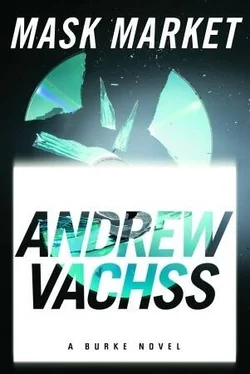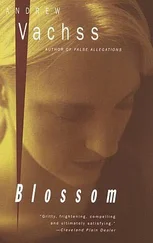“Sit, sit,” he said, pointing to a tufted armchair that matched the other furniture. For what it must have cost, it should have been more comfortable. The plate-sized brass ashtray on a wrought-iron stand next to the chair encouraged me to light a smoke.
Preston closed the door, then walked over and seated himself behind his special desk. He fiddled with a pipe—something uncharitable in me guessed it was cherrywood—until he got it going. “Tell me all about it,” he finally said.
“That wasn’t our deal,” I told him.
“Well…I guess it wasn’t. But surely you understand that I’m—”
“You wanted your daughter back. The reason you came to me was because you thought I might be able to do that. You never asked me how I was going to do it. I figured that was no accident—that was you being smart, protecting yourself.”
“You mean, there’s things I wouldn’t want to know?”
“I’m not saying that. I’m just saying we had a deal, right? Cash on delivery. And here I am, delivering.”
“I’m not disputing that. I just thought…I guess I thought you, what you do, it isn’t just about money.”
“I don’t know where you got that idea,” I said.
“From the—”
“I wasn’t asking.”
“Oh. I…”
His voice spooled out into silence until he finally accepted that I wasn’t going to say anything more. “Here’s your money,” he said, putting a neat stack of bills on the top of his desk. Probably dug it out of a safe somewhere in the house as soon as he heard my tape-recorded voice on his phone. I wondered how much he usually kept in there.
I couldn’t tell if making me step over to his fancy desk to get the money was a little bit of nastiness because I wouldn’t give him the gory details, or because he was back to being himself already—a boss, paying off a worker.
As I pocketed the cash, he answered the question. “Berry will tell me all about it,” he said, self-assured.
I found a lot of kids back then. Sometimes it was the parents who paid me. Sometimes it was the people who I took them back from. Sometimes both. Every so often, neither.
I hadn’t told Preston the truth. Not just because he was a citizen, and lying to citizens was one of the first things my father—the State—had taught me, but because of something Wesley told me once. “You can’t ever give them any reason but money,” the iceman whispered one night. “They think there’s something else in it for you, they might want to do you down on the price.”
“I set the price in front,” I replied, a little hurt that Wesley would think I’d be such an amateur.
“But you don’t get it paid in front,” he said. “And this thing you got about kids, it’s a marker. A way for people to find you.”
“People know where my—”
“Not know your address,” the iceman said. “Know you. They know that, your address don’t matter—they can get you to come wherever they need you to be.”
That was a long conversation for Wesley. He had the same one with me, over and over again, right up to the time he checked out of the hotel he had hated from the moment the State had booked his room.
I might have kept going like I was: working the edges of the fringes, a poacher on rich men’s estates, a liar, con artist, thief…and, sometimes, a man who found kids and brought them home. But after I shot a pimp, McGowan stopped recommending me. And the people who started coming to me for tracking jobs after that weren’t looking for rescue work.
I might have kept going anyway—my lifestyle didn’t require a lot of income—but things kept…happening.
I thought I was done with things like that.
“W hy did you give me this?” I asked Mama. I held up my cup of soup as if I was toasting an audience, so there wouldn’t be any doubt about what I was saying.
“You don’t like soup?” she said, ominously.
“I don’t like this soup. I mean, it’s not terrible or anything, but it’s not yours.”
“Ah!” she said, expressionlessly. “No time last night. Cook make soup himself.”
Every year or so, Mama tests to see if I recognize the one thing in that restaurant she makes herself. It would never occur to her to question that I love her, but she occasionally needs some reassurance that I love her soup.
I bowed slightly, brought my fingertips together. She removed the steaming tureen and my Barnard cup without another word.
“Prawns today,” she said. “Cook fix them good, okay?”
“I’m not hungry, Mama.”
“Max coming?”
“Should have been here already.”
“Okay,” she said, getting up and walking over to her post by the front register just as Max loomed up behind me.
As soon as he sat down, I made a gesture of ladling out a cup of soup, taking a sip. Then I made a face to indicate the soup was lousy today. Max nodded his thanks—Mama wasn’t going to waste a bogus pot of hot-and-sour without testing it on more than one of us.
I was in the middle of regaling Max with Little Eric’s monumental triumph over the Forces of Evil—that’s the Morning Line, for all you hayseeds—when the Prof strolled in with Clarence at his side. He slid in next to me, spoke out of the side of his mouth in a barely audible prison-yard whisper: “What’s with the old woman, Schoolboy?”
“What do you mean?” I said, charitably not mentioning that the Prof himself was older than corruption. Or that I knew why he was keeping his voice down.
“She tells me it’s cold out, maybe I want some soup. It’s the off-brand stuff today, am I right?”
“On the money.”
“Damn, son. You’d think she’d stop trying to gaff us with that tired old trick after all these years.”
“You want her to think up a new one?”
The little man turned and gave me a look.
“Where is my little sister?” Clarence asked, looking at his watch.
“Michelle’s not in on this,” I said. “Not this part, I mean.”
“I thought there was green on the scene,” the Prof riffed. “Something my boy found in that computer thing.”
“There was money,” I said. “All over that CD Clarence looked at, sure. But—”
“Right!” the Prof interrupted. “So—we did the scan, now we need a plan. And if we’re going to go in soft, we need our girl to walk point, don’t we?”
“The money on that CD, it belongs to the girl the guy who hired me was looking for.”
Max pointed his finger, ratcheted his thumb in the universal gesture of a hammer dropping.
“Yeah,” I said. “The guy who got smoked. And, it turns out, he was some kind of money man. Other people’s money.”
“So he wasn’t looking for the girl, he was looking for her stash?”
“I…I don’t think so, Prof. But we can’t start looking for either one without some answers.”
“But you know the girl, mahn,” Clarence put in. “That is what you said.”
“I know who she is. But the last time I saw her, she was just a kid. You saw her, too, Prof. You, too, Max,” I said, miming the last sentence.
The waiter brought a tureen of the booby-trap soup. Mama left her register just in time to see Max spit out a mouthful. He lurched to his feet, bowed an apology to the waiter.
“What’s up with this stuff?” the Prof said, pointing to the tureen. “You serving us tourist food now?” He wasn’t faking the annoyed look on his handsome face—if there’s one thing the Prof hates, it’s being upstaged.
“Oh, sorry,” Mama said. “Big mistake, okay?”
“This isn’t Mama’s soup,” I explained.
Max pointed an accusing finger at me, for not warning him.
Читать дальше











